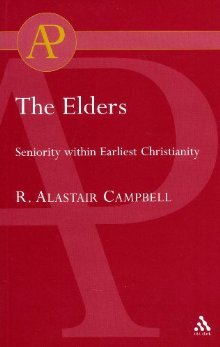R. Alastair Campbell, The Elders: Seniority Within Earliest Christianity. Edinburgh: T & T Clark, 2005.
Referenced in: Plural-Elder Congregational Leadership
LifeandLeadership.com Summary
Campbell’s essential position is stated below in the publisher’s description. It provides an interesting counterpoint to the view of Benjamin Merkle, The Elder and Overseer, which sees within the New Testament an early office of elder. Campbell argues against the actual office and designates it strictly as an honorary title, and contends that church operated from a free movement of the Spirit of God in the bestowal of gifts or charisms. The structural nature of “offices” was introduced at a later period and signaled the churches demise. This is similar to the view espoused by many contemporary Organic adherents.
From the Publisher
This is a groundbreaking study of the origins of the Church’s ministry, which focuses on the significance and role of the elders in the social world of the New Testament. Alastair Campbell challenges the consensus view among Protestant scholars of this and the last century that the elders were the holders of a definite office derived from a similar office in the synagogue. As such, they have often been seen as the representatives of a system of government which was the antithesis of the charismatic order of the Pauline churches.
The Elders demonstrates that, throughout the ancient world, among the Greeks as well as the Jews, “the elder” was a title of honor, not of office. This impressive term, collective and representative, and rooted in the ancient family or household, is here traced from the Old Testament, through the life and institutions of Second Temple Judaism and the Graeco-Roman world of the first century and through the evidence of the New Testament. Campbell discovers and describes a compelling pattern of consistency, rather than diversity, in the development of the Church’s ministry.
This investigation not only clarifies many issues in the long-running debate about charisma and office in the early church, but contributes to the contemporary debates about charismatic gifts, the ordination of women, and the search for a mutual recognition of ministries within the ecumenical movement.
About the Author
Alastair Campbell was formerly a tutor in New Testament at Spurgeon’s College, London.
***For additional information on this resource, including reviews, click the bookstore links. Check the reference at page top or the links below for resource guides on related topics.***
Other Ministry Resource Guides:
- Elders, Plural-Elder Congregational Leadership
- Elders, Policy Governance Models
- Managing Volunteers
- Ministry Teams
- Pastoral Theology
See Resources on Over 100 Areas of Ministry Leadership:


